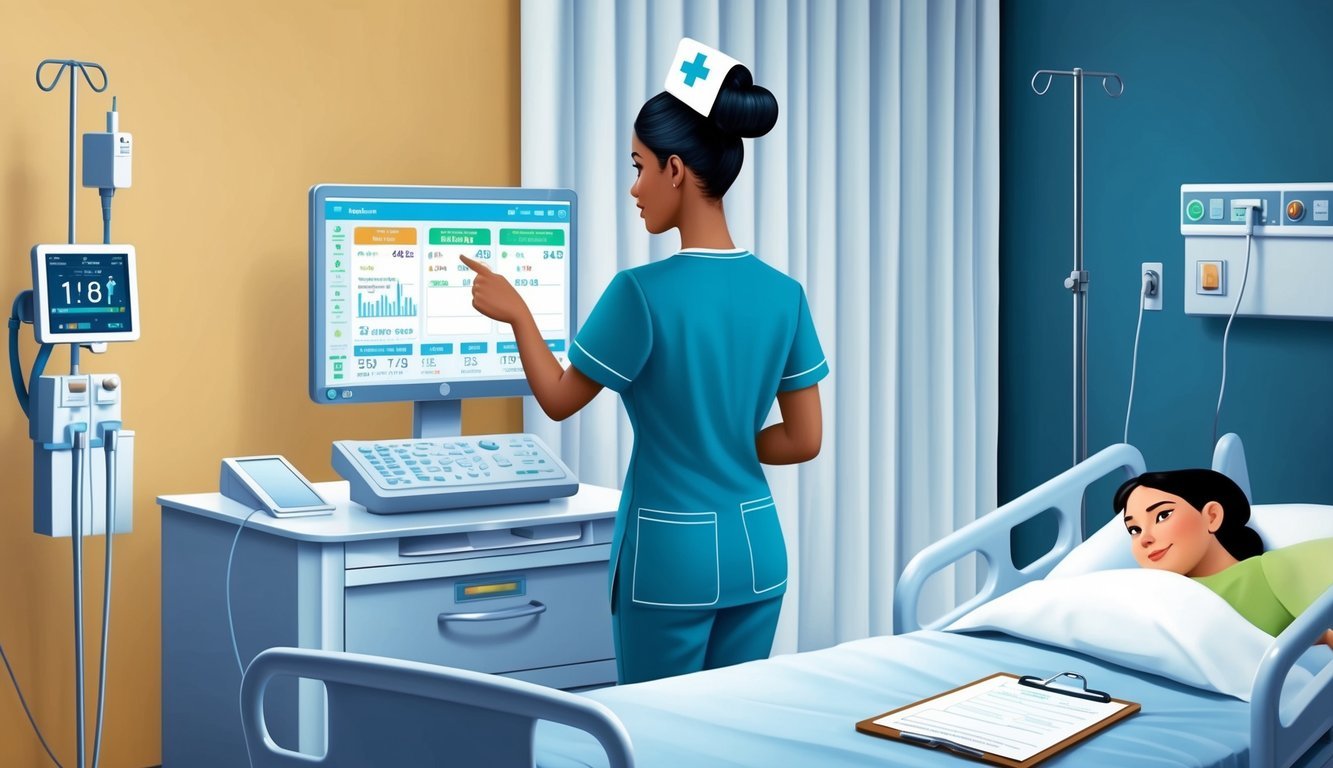As a vital part of the healthcare system, a CCU nurse specializes in caring for patients with severe heart conditions. These professionals provide critical support and monitoring for individuals experiencing life-threatening cardiac issues.
Working in a fast-paced environment, CCU nurses are skilled at managing complex situations and collaborating with other healthcare team members to ensure the best outcomes for their patients.
To succeed in this role, you must possess a strong knowledge base of cardiac physiology and critical care.
Your training and education play a significant role in preparing you for the challenges of this profession.
From assessing patient needs to implementing treatment plans, the CCU nurse’s responsibilities are both demanding and rewarding, making it a crucial career in healthcare.
The path to becoming a CCU nurse offers various opportunities for growth and advancement.
Whether you’re just starting your journey or looking to specialize, understanding the essential skills and qualifications needed can help guide your career choices.
Key Takeaways
- CCU nurses provide specialized care for patients with serious heart conditions.
- Essential skills include strong knowledge of cardiac care and critical thinking.
- There are several pathways for education and career development in this field.
The Role of a CCU Nurse

As a CCU Nurse, you play a crucial role in managing patients with severe cardiac conditions.
Your responsibilities include critical patient care, monitoring vital signs, and working closely with the healthcare team to ensure optimal treatment.
Responsibilities
Your main responsibilities involve providing direct care to patients in the critical care unit.
You closely monitor vital signs such as heart rate and blood pressure.
This helps in identifying any sudden changes in a patient’s condition.
You will also administer medications and treatments as prescribed by the attending physician.
This includes managing IVs and ensuring patients receive the correct dosages.
Communication is key.
You will report any changes in your patients’ conditions to the healthcare team.
All of this requires strong critical thinking skills and attention to detail.
Conditions Managed
You manage a range of serious cardiac conditions in the CCU.
Common cases include heart attacks, arrhythmias, and heart failure.
Each condition requires specific protocols for monitoring and treatment.
Collaborating with other healthcare professionals is vital.
You may work alongside cardiologists and respiratory therapists to provide comprehensive care.
You are responsible for understanding the various treatments available and how they apply to each patient.
Staying current on best practices improves patient outcomes.
Working in the Critical Care Setting
Working in the critical care setting demands resilience and adaptability.
The environment can be fast-paced, requiring quick decision-making skills.
In the CCU, teamwork is integral.
You collaborate closely with doctors, nurses, and other specialists to develop effective care plans.
This multidisciplinary approach enhances patient recovery.
You must also possess strong communication skills.
This helps inform patients and their families about procedures and conditions.
Your role as a CCU Nurse not only impacts patient health but also their emotional well-being.
For more detailed information about a CCU nurse’s role, you can visit AAMCN.
Essential Skills and Abilities
As a CCU nurse, you need a unique set of skills to manage patients in critical conditions.
Focus will be on clinical assessment, emergency response, and life support proficiency.
Clinical Assessment and Monitoring
You must master clinical assessment to effectively monitor patient health.
This includes evaluating vital signs such as heart rate, blood pressure, and oxygen saturation.
You will assess lab results and use diagnostic tools like EKGs.
Recognizing abnormal patterns early can make a significant difference in a patient’s outcome.
Regular monitoring helps identify complications promptly, allowing you to intervene when necessary.
Critical thinking is essential in analyzing data and making decisions about patient care.
Additionally, documenting changes accurately is key to providing continuity in care.
Advanced Life Support Proficiency
Proficiency in Advanced Cardiac Life Support (ACLS) is vital for your role.
You must be certified in both ACLS and Basic Life Support (BLS) to assist during life-threatening situations.
Know the steps for handling cardiac arrest, including defibrillation and administering medications like epinephrine.
Keeping up to date with the latest guidelines ensures that your skills remain sharp.
Knowing when to apply these interventions can be crucial.
Understanding the drug protocols and effective communication with your team enhances patient safety.
Regular drills and simulations can help you stay prepared for real scenarios.
Handling Emergency Situations
In high-stress situations, your ability to handle emergencies is crucial.
You must stay calm and focused to provide effective care.
Assess the scene quickly to determine the most pressing needs of your patients.
Equip yourself with both practical skills and communication techniques.
Utilizing teamwork is essential.
Collaborate with other healthcare providers to ensure that tasks are clear and efficient.
You should also be ready to educate patient families about the situation, helping them manage their stress while you provide care.
Practice regularly to improve your response and ensure patient safety in emergencies.
Qualifications and Education

To become a CCU nurse, you must meet specific educational and certification requirements.
This knowledge will ensure you provide the best care for patients with severe cardiac conditions.
Nursing Degrees
To start your journey as a CCU nurse, you need a nursing degree.
The typical paths are:
- Associate Degree in Nursing (ADN): This 2-year program gives you the essential skills for entry-level nursing roles.
- Bachelor of Science in Nursing (BSN): This 4-year degree offers more extensive training and prepares you for advanced responsibilities.
Having a BSN is often preferred by employers.
It can enhance your job prospects and may provide a solid foundation for future advancement in your nursing career.
After completing your degree, you must pass the National Council Licensure Examination (NCLEX-RN) to obtain your Registered Nurse (RN) Licensure.
Required Certifications
In addition to your nursing degree, you will need specific certifications to work in critical care.
The most important is the Certification in Critical Care Nursing.
This certification, offered by the American Association of Critical Care Nurses (AACN), demonstrates your expertise in critical care concepts, skills, and patient management.
To earn this certification, you typically need at least 1,750 hours of direct patient care experience in a critical care setting.
Passing the certification exam is also essential.
Maintaining this certification may require additional continuing education hours and re-examination every few years.
Continuing Education
Continuing education is crucial for CCU nurses to keep their skills current.
Many states require ongoing education as part of maintaining your RN license.
You may need to complete 20-30 hours of continuing education every two years, depending on your state.
Additionally, pursuing specialized courses in cardiac care can improve your knowledge and skills.
Options may include workshops, seminars, and online courses.
Joining professional organizations like AACN can provide access to valuable resources and networking opportunities.
Being proactive in your education allows you to provide the best care for your patients.
Collaboration in Health Care Delivery

Effective collaboration in healthcare delivery is essential for providing comprehensive care to patients.
This involves various professionals working together to ensure high-quality outcomes.
Teamwork enhances communication and fosters an environment where patient education plays a crucial role.
The Multidisciplinary Team
A multidisciplinary team includes a diverse group of healthcare professionals such as doctors, nurses, pharmacists, and social workers.
Each member brings their expertise to the table, promoting a well-rounded approach to patient care.
Key roles in a multidisciplinary team:
- Physicians diagnose and treat medical conditions.
- Nurses monitor patient health and administer care.
- Pharmacists manage medication plans, ensuring safety and effectiveness.
- Social Workers assist with personal and social challenges.
This teamwork enhances patient outcomes by ensuring that all aspects of care are addressed.
Involving various disciplines allows for shared decision-making and better problem-solving.
Exploring resources on interprofessional collaboration can provide further insights.
Patient and Family Education
Patient and family education is a vital component of effective healthcare delivery.
It empowers patients to understand their conditions and participate actively in their care.
When you educate patients, it promotes adherence to treatment plans and improves health outcomes.
Educators should focus on:
- Clear Communication: Use simple language and avoid medical jargon.
- Involving Families: Include family members in discussions to ensure support.
- Providing Materials: Offer brochures, videos, and other resources for further learning.
By prioritizing education, healthcare teams can foster a patient-centered approach that enhances satisfaction and trust.
Consider exploring effective patient education strategies for more detailed techniques.
Career Path and Development

The career path for a CCU nurse involves opportunities for specialization and professional growth.
You can advance in your role and broaden your expertise through additional training and certifications.
Specialized Units and Roles
As a CCU nurse, you have the chance to work in various specialized units such as:
| Unit Type | Description |
|---|---|
| Coronary Care Unit (CCU) | Focuses on patients recovering from heart attacks or surgeries. |
| Cardiac Intensive Care Unit | Provides care for critically ill cardiac patients needing intense monitoring. |
| Step-Down Unit | Offers care for patients transitioning from critical care. |
You can also explore roles like charge nurse or unit manager.
Specializations in areas like heart failure, cardiac surgery, or electrophysiology can enhance your skill set.
Professional Growth Opportunities
Continuous learning is essential in nursing.
You can pursue:
- Advanced Certifications: Consider becoming certified in cardiovascular nursing or as a heart failure nurse. This adds value to your resume.
- Further Education: Programs for Nurse Practitioners can prepare you for roles with greater responsibility. Options include a Master’s Degree or Doctorate in Nursing.
- Workshops and Conferences: Participating in these can keep you updated on the latest in cardiac care.
Each of these avenues helps you build nursing experience and expand your professional network.
Engaging in lifelong learning will ensure your skills remain relevant in this fast-evolving field.
Frequently Asked Questions
This section answers common questions about becoming a critical care unit (CCU) nurse, the job responsibilities involved, necessary qualifications, and salary information.
What qualifications are necessary to become a critical care unit (CCU) nurse?
To become a CCU nurse, you typically need a Bachelor of Science in Nursing (BSN) or an Associate Degree in Nursing (ADN).
Additionally, you must pass the NCLEX-RN exam to obtain your nursing license.
Experience in an acute care setting is also important for developing the skills needed for this role.
What is the typical job description of a CCU nurse?
CCU nurses provide care to patients with severe heart conditions.
You will monitor vital signs, administer medications, and assist in procedures.
Your role also involves collaborating with doctors and other healthcare professionals to develop patient care plans.
What certifications are required for a CCU nurse?
A nursing license is mandatory.
Additional certifications can enhance your qualifications.
Many CCU nurses hold certifications such as the Critical Care Registered Nurse (CCRN) credential.
This certification demonstrates your expertise in critical care nursing.
How does the role of a CCU nurse differ from that of an ICU nurse?
CCU nurses specifically focus on cardiac patients.
ICU nurses, on the other hand, may care for a broader range of critical conditions.
CCU nurses often work more with heart monitoring equipment and treatments related to cardiac health.
What is the average salary range for a CCU nurse?
The salary for CCU nurses varies by location and experience.
According to recent data, salaries can range from about $73,100 to $96,700, with an average around $83,500.
You can find updated salary information on sites like Salary.com.
How long is the training or educational period to qualify as a CCU nurse?
The path to becoming a CCU nurse typically involves completing a nursing degree.
This can take 2 to 4 years.
After earning your degree, you will need to gain experience in critical care settings.
This can take additional time depending on your career goals.

